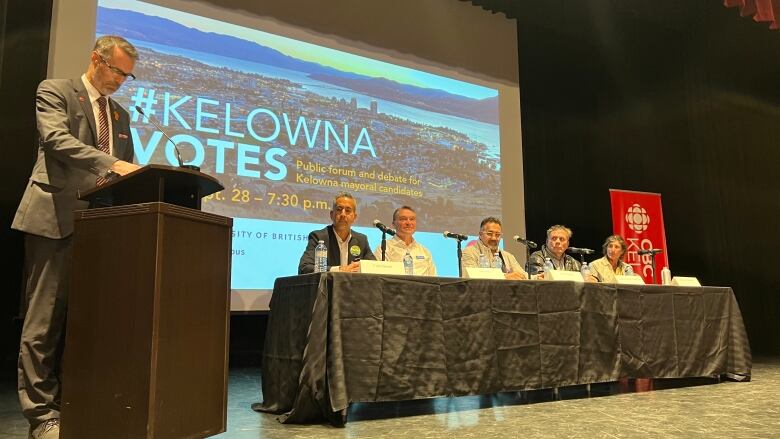Kelowna mayoral candidates debate housing, transportation and homelessness at election forum
Five candidates are competing for the role of Kelowna's mayor, including incumbent Colin Basran

Issues of housing affordability, homelessness and a looming transit strike dominated a mayoral election forum on Wednesday evening at Okanagan College campus in Kelowna, B.C.
Five candidates took the stage in front of an auditorium audience of about 200 people during the two-hour debate organized by the college and UBC-Okanagan.
Moderator Sarah Penton, the host of CBC Kelowna's Radio West, presented candidates with a variety of questions submitted by video from students at the two campuses of higher learning.
The issue of housing and affordability came up multiple times during the evening, with some students expressing concern about being priced out of Kelowna, the fastest-growing city in the country.
Incumbent Mayor Colin Basran spoke about city council's recent record on housing, with the approval of nearly 3,200 new housing units last year — a quarter of them designated rental housing.
"We got that done throughout the rental incentive program," Basran said.
"We can expand our rental incentive program to provide more missing middle housing, which is designated more for families."

Businessman Tom Dyas, who placed second to Basran in the general election four years ago, promised to reduce barriers at city hall to allow residents to build more carriage homes and secondary suites.
Dyas criticized a recent decision at city hall to raise development cost charges (DCCs) on carriage homes in Kelowna to be more in line with charges for other new housing builds.
"We recently saw carriage homes with an increase that went up by 800 per cent locally to put in a carriage home," Dyas said.
"We need to make it so that it is affordable for individuals to build those secondary residences within the community."
Candidate David Habib, who runs a downtown nightclub, pitched the idea of pushing to develop unused farmland within city limits.
"There is a lot of vacant land that's farmland within the ALC (Agriculture Land Reserve) that could easily be taken out, Habib said.
"We've got to get that stuff out and convert it to affordable housing."
Housing affordability plays into the issue of a growing homelessness crisis that Kelowna is facing.

When asked for solutions to homelessness, Dyas replied that the solutions lie with the city and not on other levels of government.
"What we need is strong leadership within our community to realize that this is a problem with our community and to make a difference and move the dial on homelessness within our community."
Basran spoke about a plan to continue working with the province to reform B.C.'s justice and health-care systems in order to deal with people who live on the streets and repeatedly commit crimes.
"We need to continue to push for beds, units, treatment but also consequences for those who continue to break the law," he said.
Candidates were also asked questions about Kelowna's transit system, which many students rely on to get to campus, and the current labour dispute that has bus drivers poised to walk off the job next week.
Basran said while he supports some of the things transit workers are seeking in a new contract, he's asked B.C.'s labour minister to legislate them back to work in order to protect transit service in the region.
"I will also continue to advocate for that essential service designation as we know so many people rely on that transportation as it's their only form of getting around," he said.
Dyas suggested the city needs to push to have transit drivers employed locally instead of by a foreign corporation, U.S.-based First Transit, which currently holds the B.C. Transit contract in Kelowna.
The suggestion was echoed by candidate Silverado Socrates, a Kelowna businesswoman and former track and cross-country athlete.
"I think that we could be looking at hosting it within the regional district ... the regional district hires them and organizes it," she said.
Kelowna builder Gordon Smedley also participated in the election forum.

